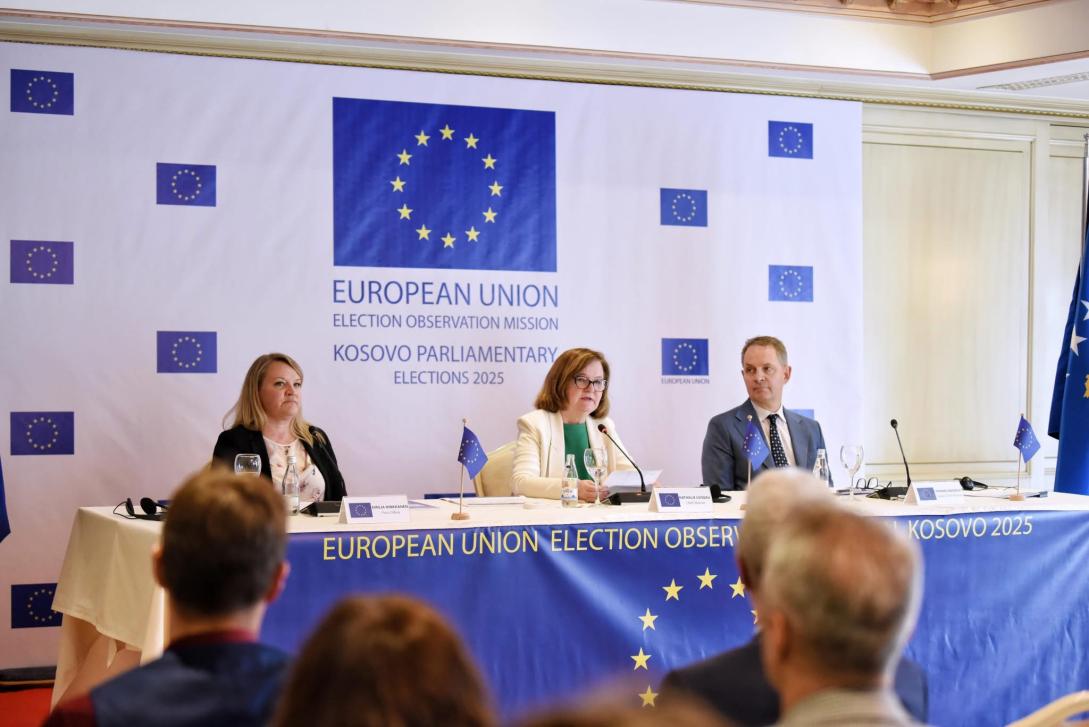European Union election observation mission publishes its final report with 19 recommendations; genuine political will needed to reinforce democratic institutions

The European Union Election Observation Mission (EU EOM) to Kosovo today published its final report on the 9 February 2025 parliamentary elections. Chief Observer Nathalie Loiseau, Member of the European Parliament, said: “Kosovo’s 2025 parliamentary elections were competitive, and held under a new legal framework designed to strengthen transparency and trust. However, the process also revealed significant organisational challenges, polarised political discourse, and areas where reforms are still needed.”
In its final report, the EU EOM highlights that while election day was generally well run and the campaign dynamic, the process suffered from insufficient preparation by the Central Election Commission, delays in result tabulation and politicisation of key institutions. The Independent Media Commission (IMC) failed to sanction media violations. While the media landscape remains diverse, it is deeply divided along ethnic lines, and only limited efforts were made to foster cross-community dialogue. Some private media showed signs of politicisation. Concerns also remain regarding the challenges faced by the public broadcaster.
Chief Observer Nathalie Loiseau emphasised: “The recommendations are a roadmap to reinforcing democratic institutions in Kosovo. There is a need for genuine political will and meaningful dialogue from all electoral stakeholders to implement these successfully. The European Union remains committed to supporting Kosovo in this process.”
Although the legal framework provides a sound basis for democratic elections, its implementation exposed ambiguities that call for legislative clarification. The new electoral law introduced welcome reforms, but its effectiveness was undermined by a lack of preparedness and operational shortcomings.
The final report offers 19 recommendations, including six priority recommendations aimed at strengthening Kosovo’s electoral processes. These are:
-
Strengthen legal safeguards in regard to membership and conduct of election officials to ensure the impartiality and independence of the election administration.
-
Delimit and further specify responsibilities of the Central Election Commission, the CEC Secretariat and municipal election commissions to decentralise decision-making of the election administration where appropriate and ensure efficiency and timeliness of its operations.
-
Conduct a comprehensive independent audit of the voter list, including through internal analysis of registration processes and statistical and field testing, in consultation with the relevant stakeholders to address concerns over accuracy and to increase public confidence.
-
Introduce clear legal definitions of key terms, including those related to inflammatory language and the designation of a ‘political entity supporter’ within the electoral process. Establish explicit criteria for determining proportional fines applicable to breaches of the Code of Conduct by political entities.
-
Appoint all members of the IMC in a timely manner and through a competitive and transparent selection process.
-
Establish a reliable and transparent results management system with clear and verifiable procedures to ensure accurate processing of the results data. Ensure prompt access to the preliminary results, including all relevant data such as voter turnout, valid and invalid votes as well as scanned results forms per polling station.
At the invitation of Kosovo’s authorities, the EU EOM operated in Kosovo from 8 January until 27 February 2025 and was joined by an election observation delegation from the European Parliament. The EU EOM deployed a total of 104 observers from all EU Member States, as well as Canada, Norway, and Switzerland.
CONTACT DETAILS
Emilia Hinkkanen, Press Officer, emilia.hinkkanen@eueomkosovo2025.eu, +383 45 536 911
